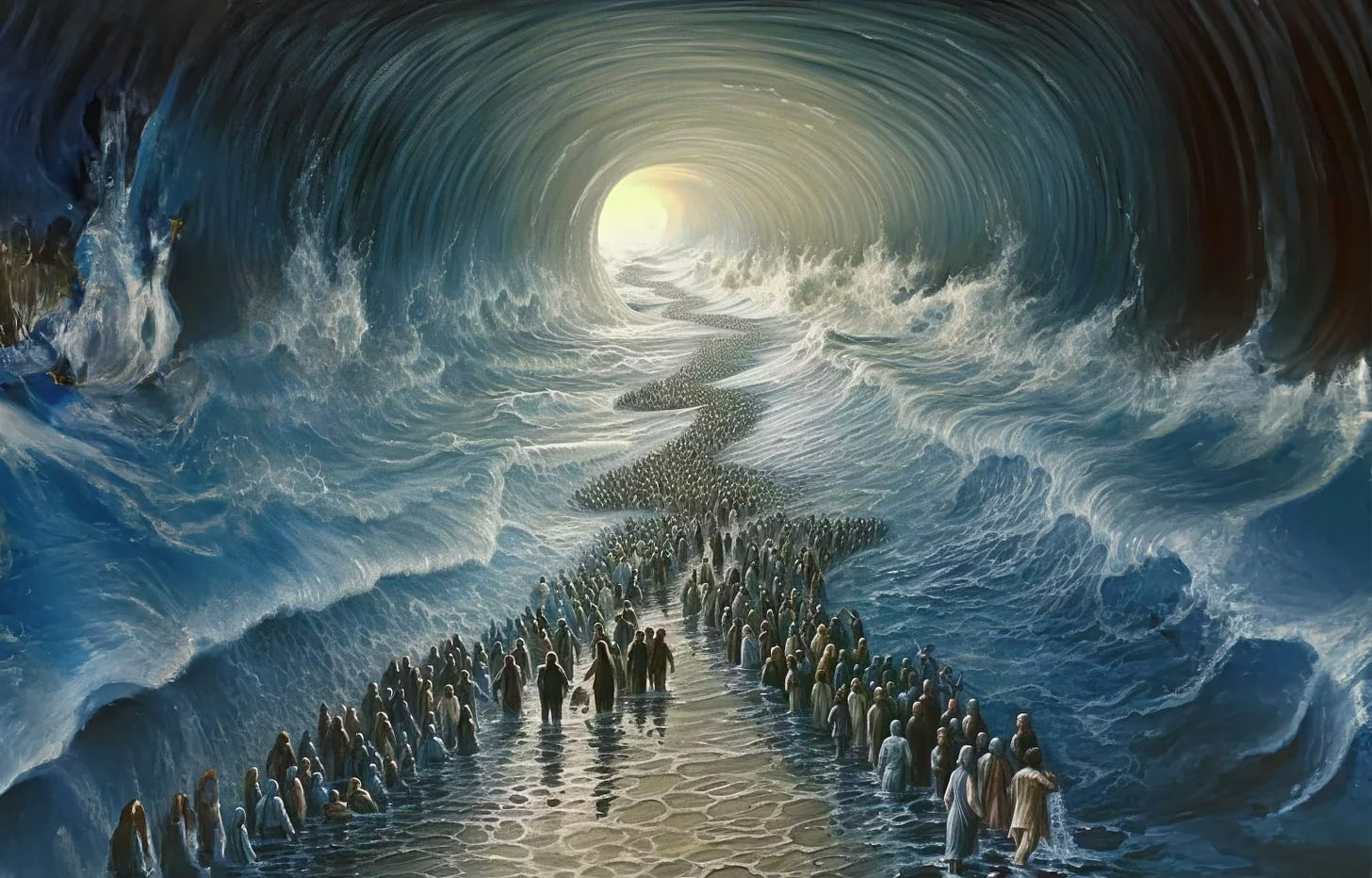[This piece was originally featured in the one people magazine, a project by Partners Detroit]
While conscious experience is a powerfully dynamic mechanism, it rarely feels like we are in the driver's seat. Neuroscience and psychology have significantly advanced, but the human condition remains an enduring mystery. We still don't fully grasp why some people are more prone to depression and anxiety. Or why some individuals tend to be more resilient than others. In fact, we don't even understand why conscious awareness feels like it does.
A frustrating aspect of the psychological process is its elusiveness. In darker periods, our minds can feel like a cage to which we don't have the keys. A restricted or negative thought pattern can be far more difficult to escape than any external scenario. Even if not in extreme form, many of us will face this struggle sooner or later. Indeed, it's no secret that modernity's many pressures have made anxiety and depression a norm. Health professionals diagnose a mental disorder in more than fifty per cent of American adults throughout their lives, with one-fifth of the country's population suffering from a psychological condition each year. Of course, people should take all necessary health measures when encountering an emotional crisis; that is a given. But how does Judaism respond to these challenging experiences?
Passover presents an opportunity for partially developing such an approach. While the exodus from Egypt was a historical event on a societal scale, the Chassidic master's elaboration on its significance reverberates with implications for the individual today. Etymologically the Hebrew name for Egypt, Mitzrayim, can be associated with the word Meitzar, meaning a place of constriction. Chassidic thought considers every jew to experience both exile and redemption, transcending his or her constricted existence and entering a state of expansiveness. On a personal level, events like these parallel the national experience of the enslaved Israelites that occurred thousands of years ago.
The Chassidic commentaries have thus recast the exodus narrative as an allegory for each individual's day-to-day vicissitudes. This reinterpretation allows us to relate to the historical account on a more subjective plane, finding meaning in the complexities of our own lives. We gain strength and hope in our journey by connecting personal trials and a broader Jewish tradition.
As devastating as physical enslavement must have been for the ancient Israelites, psychological trauma would have had even broader implications. While slavery is an act of material restriction, it is also a spiritual and emotional assault on the enslaved. As the Egyptians deprived the Israelites of their sense of autonomy, they were also close to robbing them of their faith and identity. So much so that the Jewish people had become almost indistinguishable from surrounding Egyptian society; the verse goes as far as to compare God's act of extracting the Jews from Egypt to the action of removing one nation from the womb of another. In other words, we had become enmeshed and inculcated into our surrounding milieu so that our very life force was now inextricably linked with our oppressors. It was like removing a stubborn noodle from a pot of boiling water.
Even to an objective observer, the situation would have appeared dire. There is no other way to cut it; the Jewish redemption was a close call. So close, in fact, that our sages teach that by the time of the exodus, we had descended to the 49th level of impurity. We were teetering on the precipice of spiritual oblivion. If we had sunk to the 50th rung, God would no longer have considered us worthy of redemption. It only gets bleaker for Jews when you think that the Egyptian state was one of the most potent hegemonies of the era, wielding vast military resources.
We, too, can find ourselves similarly restricted in our own lives, miserably occupying a void where despondency and desperation are the only possible reactions. No amount of rumination, meditation, or paid vacation offers hopes for a way out of our minds crushing labyrinth. But it is precisely here, in the depth of hopelessness, where we can be privy to the Jewish understanding of God's redemptive mechanism.
What is evil? What is darkness? We aren't interested in their definitions but in their essence. Foreshadowing this dialectic between dark and light, exile and redemption, our ancestor Joseph is mercilessly left to rot in an Egyptian dungeon. Events then catapult him from the depths of incarceration to the halls of political authority. The verse reveals the time has come for him to finally leave jail, but the midrashic response is cryptic. For reasons unexplained, our sages make a connection between Joseph's release and the phrase, keitz sam lechosech, 'God gives an ending to darkness'. Their use of the term Keitz here is critical. We generally translate Keitz as 'ending', but other such words are available in the Biblical lexicon, for example, Kaloh. Is there anything unique about the word keitz?
We can more accurately render Keitz as meaning 'to cut', i.e. it denotes an externally imposed end. And this distinction illuminates an essential dimension of understanding. Visavi our worldly experience of evil, there seems no apparent reason for darkness to have a natural end. Rabbi Sacks once pointed this out to Richard Dawkins, insisting hope has no rational basis. However, as the Ramchal explains in his classic work Derech Hashem, there always comes a point where God will pull the plug on evil.
The collapse of the USSR is an excellent example of such a phenomenon. At the time, there were no identifiable causes for the Soviet state to disintegrate almost overnight as it did. Even today, historians are still unclear about what exactly led to the unforeseen eclipse of a seeming world power and military juggernaut.
Crucially, we see that the end of darkness is rarely imaginable for the individual immersed in it. God, on the other hand, observes evil from an elevated perspective. Unlike humanity, which is limited to the reality they inhabit, God can conceive infinite options beyond our present scope.
We could list a multitude of legitimate avenues with which to approach mental health issues—prescription medication, participating in therapy, relaxation techniques, exercising regularly, meditation and more. Yet the sheer range of approaches speaks to our difficulty pinpointing a solution to a highly inconsistent challenge. Thus, some have accused psychology of not qualifying as a science. Unlike other medical disciplines, we can not break down psychological treatments into exact rules or laws. Furthermore, the field relies heavily on subjective interpretations of data and experiments, making it challenging to draw definitive conclusions. In reality, the mind's inner workings are so varied that they resist being constrained to a singular system.
But in an age that seems to present an oven-ready fix for any given problem, these frustrating facts surprisingly allow us to experience the guiding hand of God. When a previously unconceived or misunderstood option surfaces and eventually evolves into a solution, we experience an almost magical transition from a place of constricted thinking to a place of openness. And in doing so, we gain new meaning in understanding Dovid Hamelech’s profound words, 'Out of my straits I called upon the Lord; He answered me with immense expansiveness'.
Our approach may offer another angle for understanding the culminating miracle of the Exodus narrative—God's splitting of the red sea. Caught between a blood-baying Egyptian militia on one side and the ocean on the other, the Israelites had no way out. In light of the geological reality, Pharaoh would victoriously contend that "They [the Israelites] are trapped in the land. The desert has closed in upon them”.
Once again, the Jewish people were caught in that all too familiar place of constriction. Yet as they called to God out of the straits, his answer did not depend on any prior situational factors but instead derived from an immense expansiveness:
When God opened up the depths of the sea so that the Israelites could cross on dry land, he was unlocking an entirely unforeseen possibility.
Such an option was obviously beyond the predictive capabilities of anyone present, Egyptian or Jew.
We all have moments, months and years in our lives that seem like unforgeable expanses of ocean—stuck in a cycle of monotony, unable to move forward. Seeing a way out of such circumstances is difficult, and our options appear limited. Yet as the descendants and progenitors of this historic Jewish nation, we too can hope for God's unforeseen solution. A transformative, transcendent occurrence. An answer that takes us to a place we had never dreamed of.
Have A Great Pesach, and Keep Pondering!





